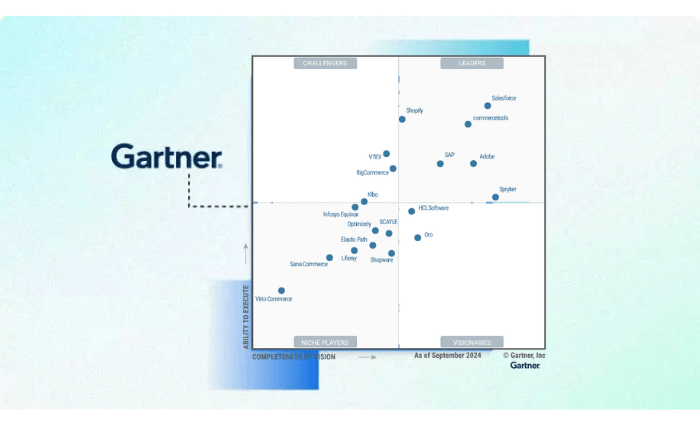Choosing the right e-commerce platform is a pivotal decision for the growth and success of your business. Whether you’re a high-growth enterprise, a mid-market brand, or a global player, the platforms listed here offer powerful solutions for your e-commerce needs.
1. Shopify Plus: Enterprise Power, Simple to Use
Key Strength: Scalability with Ease of Use
Shopify Plus caters to enterprise-level businesses, offering the same user-friendly interface as the basic Shopify plan, but with enterprise-grade features like advanced customization, automation tools, and dedicated support. Shopify Plus can scale with high-growth brands that need more robust infrastructure.
Area for Improvement: Limited Customization for Complex Needs
While Shopify Plus is designed to scale, it still has limitations when it comes to highly complex customizations. Enterprises looking for complete control over backend systems may find the platform’s customization options somewhat restrictive.
2. Adobe Commerce (Magento): Robust for Enterprises
Key Strength: Unlimited Customization Options
Adobe Commerce (formerly Magento) is a powerful platform offering extreme flexibility, making it perfect for larger enterprises that require tailored, scalable solutions. Its open-source nature allows developers to build nearly any feature.
Area for Improvement: High Complexity and Cost
Adobe Commerce’s customization capabilities come at a price, its complexity. It requires a dedicated development team for management and updates, which makes it less suitable for smaller businesses with limited budgets.
3. VTEX: Strong Multi-Tenant Capabilities for Enterprises
Key Strength: Multi-Tenant SaaS Architecture
VTEX is highly regarded for its multi-tenant SaaS infrastructure, making it ideal for businesses running multiple storefronts or regions. Its ease of integration across different channels gives enterprises the flexibility to expand globally.
Area for Improvement: Steeper Learning Curve
VTEX’s advanced features come with a steeper learning curve, making it challenging for businesses without a solid IT team to take full advantage of its offerings.
4. Salesforce Commerce Cloud: Best for Personalization
Key Strength: Integration with Salesforce Ecosystem
Salesforce Commerce Cloud stands out due to its seamless integration with Salesforce’s CRM system, offering personalized, data-driven customer experiences. Businesses that already use Salesforce benefit from the platform’s unified ecosystem.
Area for Improvement: High Implementation and Learning Costs
The platform’s powerful capabilities come at a cost—both financially and in terms of complexity. The initial setup and learning curve can be demanding, especially for businesses new to the Salesforce environment.
5. Fabric: The Best for Headless Commerce Solutions
Key Strength: Headless Architecture for Flexibility
Fabric commerce is a leader in headless commerce, offering the flexibility to customize front-end experiences while maintaining a robust back-end. This decoupled architecture is perfect for brands seeking creative control over customer interactions.
Area for Improvement: Not as User-Friendly for Beginners
While Fabric is incredibly flexible, its headless nature requires more technical expertise to implement and maintain, making it less suited for small businesses without a development team.
6. BigCommerce: Ideal for Growing Mid-Market Brands
Key Strength: Built-In Multi-Channel Capabilities
BigCommerce excels in enabling businesses to sell across multiple platforms like Amazon, eBay, and social media channels. Its built-in features reduce the need for third-party apps, making it an excellent choice for growing brands.
Area for Improvement: Limited Theme Customization
Although BigCommerce offers many features, its design customization options are more limited compared to competitors like Shopify Plus or Adobe Commerce. This can restrict creative control for brands looking for highly unique storefronts.
7. Spryker: Perfect for Complex B2B, B2C, and Marketplaces
Key Strength: Modular Architecture for High Customization
Spryker’s modular architecture makes it an excellent choice for businesses with complex B2B and B2C models. It allows for flexibility in building customized digital ecosystems, making it highly scalable.
Area for Improvement: Requires Skilled Development Teams
Due to its flexible, modular structure, Spryker requires skilled development teams to fully unlock its potential. This can make it cost-prohibitive for smaller businesses or those without the necessary technical resources.
8. SAP Commerce Cloud: Ideal for Large Enterprises
Key Strength: Strong Enterprise-Level Features
SAP Commerce Cloud is a leading platform for large enterprises that need complex integrations and global scaling. It offers excellent support for B2B and B2C operations with strong multi-channel capabilities.
Area for Improvement: High Setup and Operational Costs
SAP’s enterprise-grade features come with significant costs, both in terms of setup and ongoing maintenance. This makes it less ideal for smaller businesses or those with limited budgets.
9. Oracle CX Commerce: Best for Data-Driven Enterprises
Key Strength: Powerful Data-Driven Personalization
Oracle CX Commerce excels in delivering personalized experiences through its AI-driven recommendations and customer insights. It integrates smoothly with other Oracle cloud solutions, making it an attractive option for data-centric enterprises.
Area for Improvement: Complex Implementation Process
The platform’s complexity often requires professional development and consulting services, making it difficult for smaller businesses or those without dedicated IT teams to implement and manage.
How to Pick the Right E-commerce Platform for Your Business
1. Business Size and Growth Potential
Different platforms cater to different business sizes. Shopify Plus and BigCommerce work well for growing mid-market and enterprise-level businesses, while enterprise solutions like Salesforce Commerce Cloud or SAP are more suitable for large-scale operations.
2. Technical Resources
Platforms like Fabric and Spryker offer flexibility but require technical expertise, while solutions like Shopify Plus or BigCommerce are more user-friendly, even for non-technical users.
3. Customization Needs
If customization is crucial for your business, platforms like Adobe Commerce and VTEX are excellent choices. For businesses seeking quick setups with moderate flexibility, BigCommerce or Shopify Plus might be a better fit.
4. Scalability and Multi-Channel Capabilities
Growing brands should look for platforms like Salesforce or Magento that support scaling across channels and regions.
For Reference: https://www.gartner.com/reviews/market/digital-commerce
Ready to Choose the Right E-commerce Platform?
Choosing the right e-commerce platform is a critical step for your business’s success. At Frontlevels, we specialize in helping businesses make the best decision based on their size, growth potential, and technical needs. Let us guide you in selecting the platform that will drive your brand forward.

